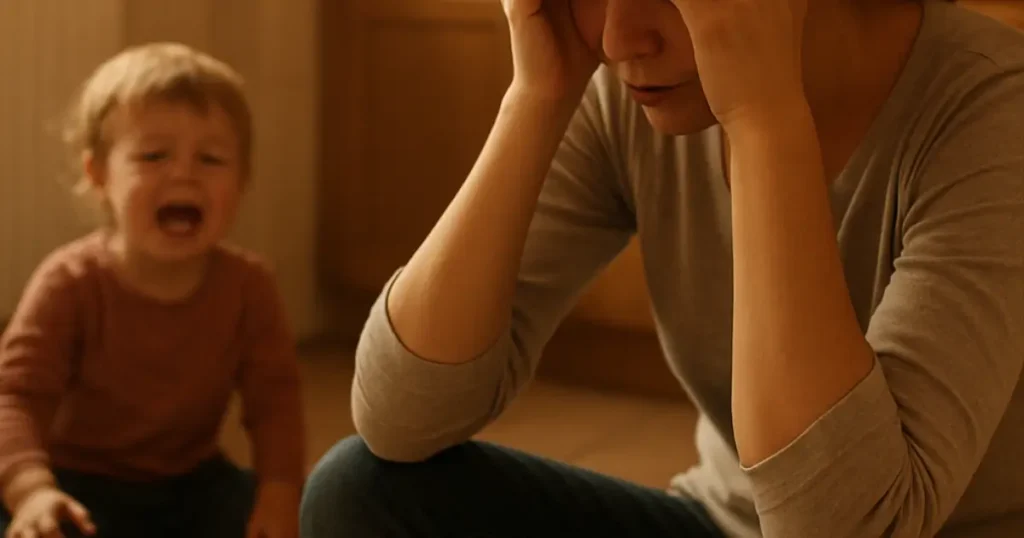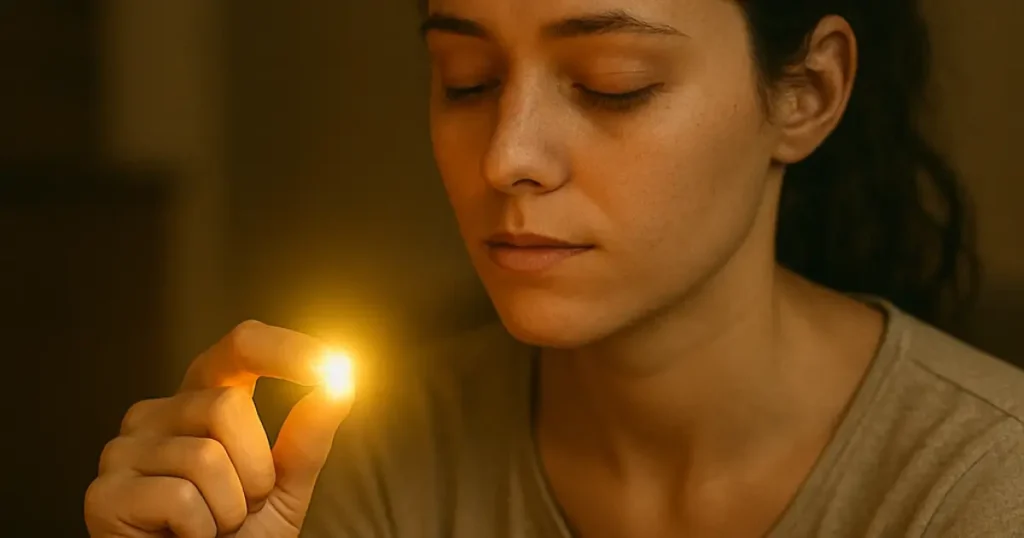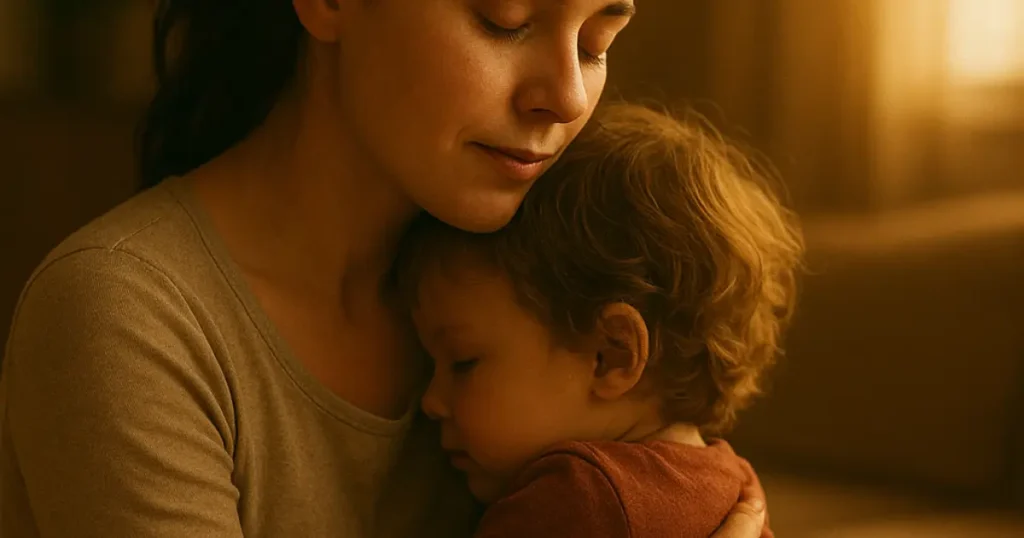The day had broken her in ways she couldn’t quite name. One child was screaming for a red cup instead of the blue one, another had drawn all over the walls with black marker, and the baby’s cries had layered themselves on top like an endless siren. She tried to hold three voices, three needs, three fires all at once — and found herself shouting louder than all of them.
The baby’s cries only grew sharper. The wall still bore the black scribbles. Her oldest slammed his door and yelled, “You never listen!”

That was the moment she stepped outside, her chest tight and her tears pouring hot. She sat on the curb, the damp pavement seeping through her jeans, and let her sobs rise, unfiltered.
Through blurred eyes, she saw her: an older woman, steady and calm, as though she had been waiting. She didn’t pry, didn’t ask. She simply pressed a small box into the mother’s trembling hands.
“When the storm breaks you,” the woman said, “take one. It will not silence the children. It will change the way you see them.”
Before the mother could respond, the woman was gone.
That evening, another storm came. Her toddler refused to eat, threw the plate on the floor, and shrieked until the baby joined in with piercing cries. Her older one shouted from the hallway, “Why do you love them more than me?”
Her head spun, ears ringing, throat raw from shouting back. Her hands shook. She felt the familiar flood of guilt rise: I’m failing. I’m failing them all.
And then she remembered. The box.
She fumbled it open, swallowed one glowing pill.

The change was not quiet at first — it was sharp. The noise didn’t stop, but it slowed. Like a camera lens pulling into focus, the chaos separated into strands she could see. The baby’s cry was high-pitched hunger, not rejection. The toddler’s scream was panic from a body too tired to eat. The older child’s words weren’t cruelty — they were loneliness, aching to be noticed.
Her breath deepened, her jaw unclenched. The screaming that had felt like a single wall of sound revealed itself as a chorus of needs. For the first time all day, she saw her children as they were: not enemies, not burdens, but small souls asking for something they didn’t know how to name.
She bent low, gathered the baby, kissed the toddler’s damp hair, and reached a hand toward the older one. The storm was still there — but she wasn’t drowning in it anymore.

Days went on. Each time her patience threatened to shatter, she reached for the pill.
When her toddler kicked and screamed on the supermarket floor, faces staring from every aisle, the pill slowed her heartbeat enough to see the child’s shaking hands, the exhaustion behind the rage. She picked him up, whispering, “You are safe,” instead of snapping, “Stop embarrassing me.”
When the baby wailed at midnight and her body screamed for rest, the pill softened the edge of her anger. She saw, instead, a child with tiny fists clutching for comfort in a vast, dark world.
When her oldest screamed, “I hate this family!” and slammed his door, the pill revealed not defiance, but a small boy drowning in jealousy. She found him later, curled under his blanket, and held him without words until his breathing softened.
The pill gave her something she didn’t know she’d lost: the ability to slow down enough to see the heart beneath the noise.
But then came the night that almost broke her.
The baby had a fever, hot and restless against her chest. The toddler threw blocks at the wall and screamed until his voice cracked. The oldest shouted from the doorway, red-faced, “You never care about me!” The sink overflowed with dirty dishes, the phone buzzed with unpaid bills, and her head felt like it would split open.
Her hands shook as she grabbed for the little box. She needed the pill — now. She opened it with desperate fingers.
Empty.
Her stomach dropped. Her chest tightened. For the first time, panic took her. How will I survive this without it?
She wanted to collapse. To scream back louder than them all. To disappear.
And then, in the middle of her shaking, something surfaced. She remembered the feeling: the way the pill had slowed her heartbeat, softened her sight, pulled her back into presence.
She set the empty box on the counter. Pressed her hand over her chest. Took one deep breath. Then another. Then another.
And with that, it came back: the shift, the widening. She saw her children again, not as chaos, but as signals. The baby’s heat was fear, the toddler’s screams were confusion, the oldest’s anger was longing.
She bent low. Held them one by one. Her voice didn’t rise. Her eyes stayed soft. She carried them through the storm without drowning.
Later, when the house was quiet, she picked up the empty box. She smiled through tired tears.
The pill had never been the magic. The magic was her breath. Her choice. Her willingness to see.
The box was empty, but she was not.
And she finally understood: she had carried the pill all along.
✨
🌿 The Hidden Meaning Behind The Magic Pill Every Mother Carries Within
Every story hides a mirror. This one reflects the quiet truth about modern motherhood: we crave relief, yet the cure we seek is already living inside us. The “magic pill” is not something mystical—it’s a metaphor for presence, slowness, and conscious pause.
Below, let’s look deeper at what each part of the story reveals about parenting and ourselves.
💫 The Crying Mother: When Overwhelm Takes the Wheel
The mother’s tears represent the moment every parent reaches sooner or later—the breaking point where love meets exhaustion. In that storm, logic fades, and only emotion speaks.
We’ve all been there: the kitchen is loud, your child is screaming, your patience slips through your fingers like water. You don’t want to yell—but you do.
That’s when the story begins. That’s when transformation is possible.
🌙 The Wise Woman: The Voice of Inner Wisdom
The wise woman doesn’t come from the outside. She symbolizes that still, gentle voice within every mother—the one that whispers “pause” just before the anger rises.
We often silence her under noise, schedules, and guilt. But she’s always there, ready to hand us the “pill” of awareness.
The moment we remember to breathe, to notice instead of react—that’s the wise woman speaking.
🌸 The Magic Pill: The Pause That Changes Everything
The pill’s effect—how it slows time, softens the edges, and helps the mother see—is the power of mindful awareness.
Each time she takes it, she doesn’t escape her reality—she enters it more deeply. She begins to see the reason behind her child’s tantrum, not just the noise of it.
That’s the secret medicine: slowing down enough to see the child’s need beneath the behavior.
🔥 The Empty Box: The Moment of Realization
When the box runs out, it’s not tragedy—it’s awakening.
Because the pill was never chemical magic. It was a ritual of remembering, a doorway back to awareness. The true medicine was her own stillness.
That’s the message:
What we think we need to take, we can learn to become.
The story invites every parent to rediscover that inner capacity—to meet chaos not with control, but with consciousness.
🌾 Reflection: Taking the Pill Without a Box
Every parent has moments where the noise feels louder than love. But the true test of growth is not in how perfectly we respond—it’s in how quickly we return to awareness after we lose it.
The magic pill isn’t something we swallow; it’s a shift we practice. A slow inhale before reacting. A softer gaze before judging. A small question whispered inside: “What is my child really asking for right now?”
That’s how we take the pill—without the box, without the wise woman. Just us, raw and real, remembering that love doesn’t need to be perfect to be powerful.
